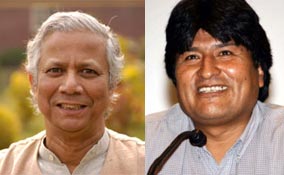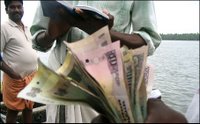Sarapan Ekonomi has been facilitating a discussion about why our farmers stay poor (i.e.,
here and
here). Surely an ambitious topic for some exchange of a few paragraphs, but I salute the initiative, the underlying idealism, and the lively discussion that also involves economists
Arya and
Ujang.
Although not an economist, I nevertheless want to contribute some thoughts, especially after my three-day visit to Muneng, a village in Kabupaten Madiun, East Java.
Despite winning a "swasembada pangan" (food self-sufficiency) award in 2002 from the Ministry of Agriculture, more than 40% of Muneng's residents
remain poor. More than half are only
elementary school graduates. This condition, among others, contributed to the selection of Muneng as a site for
BPDE/
Bappenas/
UNDP's "telecenter" project that aims to use "
ICT for poverty reduction." The project's main idea is that lack of access to ICTs is a major factor of poverty.
After some time working with poor farmers, project implementers have found that farmers' poverty is caused by a multitude of factors, and that lack of access ICT is merely one of them. Below, I will describe those other factors from their perspective, NOT in any specific order of importance.
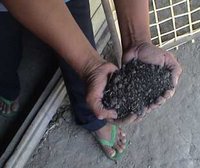
One factor is dependency on chemical fertilizers and pesticides. Farmers don't produce these, companies do. Currently community organizers in Muneng and
Pabelan, Central Java (another site for the project) are facilitating a few farmers' request to return to using organic fertilizers and natural predators to kill pests. These few now believe that organic farming produces better and more yield.
[above: pic of organic fertilizer]The second factor is farmers' lack of liquid assets (money). And no, this is not a tautology. Growing rice takes 4 months. During this time, a farmer may need money (regardless of whether they own land). So they borrow from "loan sharks" either with above market interest rates, or with an agreement that these "sharks" will buy their yield later, at below market price. With this condition, even farmers who's now doing organic farming sometimes have to sell their cow or goat's dung to these "sharks," only to buy it back later at higher price to be used as organic fertilizers.
The third factor is the small plots of land owned by each farmer, as Sarapan Ekonomi pointed out. Yes, this has been realized both by farmers and the Provincial government. That's why the province has started a program called "
cooperative farming" (which is then also adopted by the Muneng telecenter), in which farmers who normally only have 0.3-0.4 hectare of land would be organized to collectivelly work on a minimum of 50 hectares land. However, as many field workers will tell you, organizing - much less land consolidation - is much easier said than done.
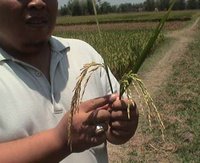
The fourth factor is related to conservative mindset and passive attitude. Since many farmers have forgotten the principles of organic farming that their ancestors once knew, now they are hesitant to try out a "different" method. Many would rather be "pasrah" (accept an uncomfortable condition) rather than force themselves to lean and invest in new things. "What if organic farming doesn't give better results?" they ask. So organizers gave them examples of successful organic farmers in nearby village. "What if it wouldn't work here? The soil may be different!" so they'd refute.
[above: pic of organic paddy (right) compared to non-organic paddy, both at same age. The organic paddy is fuller and weighs more]
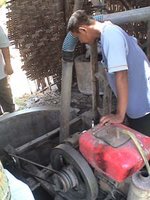
Pak Sukat is a successful farmer in the village of Babatan, 7 km away from Muneng. From the telecenter, he'd downloaded the latest methods to grow melon (including use of more organic fertilizers). Now he produces melons (and tomatoes, and rice) with less cost and more yield. One thing he had to do was to install a water pump on his farm to ensure water. Muneng residents, however, have been very reluctant to follow this method. "What if nothing changes, although we've invested in building the pump?" they'd ask.
[left: pic of Pak Sukat with his water pump]The latter is a soft factor, which sadly is too often overlooked, simply because it is ‘invisible and tacit.' Technocrats' ideology that the future can be engineered, and that poverty is in essence a technological (and/or market-related problem), fails to see that it is more likely to be caused by ‘a crisis of the spirit, a loss of political will, a cycle of self-defeat, and essentially about powerlessness, about fear, about the deadening realization that one’s children will not have a better life.’ This is Inayatullah in
Transforming Communication: Technology, Sustainability and Future Generation.
So there you go. Four factors as to why farmers are poor, based on three-days' interaction with with field workers, right in the village of Muneng. Surely this is not meant to generalize all Indonesian farmers, as I've also found some who are very progressive, such those organized by
SPPQT federation in Salatiga/Central Java. Are there more factors to farmers' poverty? Sure: take lack of access to affordable quality seeds, post-harvest processing, markets, and more. Which factor is the most important? I wouldn't be interested. They all matter and has to be dealt with equal seriousness. It's not a matter of "either or", but "
both and also."
 technorati tags: development, farmers, poverty, ICT-for-development
technorati tags: development, farmers, poverty, ICT-for-development
technorati tags: ICT-for-development
